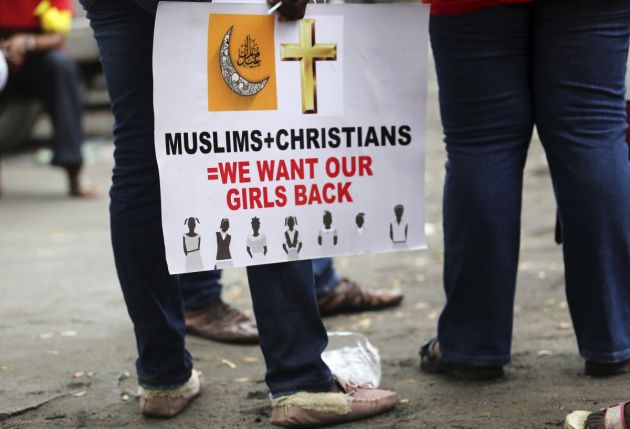Nigerian Christians praise Muslim group's call to government over Boko Haram's terror actions

Nigeria, Africa's most populous nation with an estimated 210 million people, has a distinctive mix of people with almost equal numbers of Christians and Muslims, most of whom get on, living their normal lives intertwined in peace, except when terror strikes.
Therefore, when one of the country's leading Muslim organizations spoke out against the terror unleashed by the Boko Haram extremist group in the name of Islam, Nigerian Christian leaders welcomed it.
The statement followed frequent criticism from many in the country, including church leaders and ecumenical organizations associated with the World Council of Churches, that the government has not done enough to protect the people from this terror.
The militant Islamist group Boko Haram - which has caused havoc through its wave of bombings, assassinations and abductions - is fighting to overthrow the government and create an Islamic state.
Boko Haram promotes a version of Islam which makes it "haram," or forbidden, for Muslims to take part in any political or social activity – including education – associated with Western society.
On June 17, Jama'atu Nasril Islam or JNI said in a widely reported press release that it is "in utter shockwave over the unfortunate repeated incidences of loss of precious lives and wanton destruction of property arising from well-coordinated attacks of armed bandits, Boko Haram terrorist groups and rapists."
Elder Uzoaku Williams, president of the Women's Wing of the Christian Council of Nigeria and publicity secretary of the Interfaith Dialogue Forum for Peace, said in reaction, "I deeply appreciate the timely and prophetic response of JNI."
JNI said, "These repeated calamitous scenarios would have been avoided had the government risen to the occasion.
"We nonetheless as always condemn the repeated brutal acts in their entirety; especially the lackadaisical attitude of relevant security agencies that seemed to be overwhelmed, despite repeated calls by concerned and well-meaning Nigerians for decisive action."
'BUILDING BACK THE NIGERIAN NATION'
"It is time that religious organizations collectively rescue the nation that is fast enveloping with silence in the face of gruesome destruction of lives and property. I totally align with JNI and together we can build back our nation Nigeria," said Elder Williams.
JNI said in its statement, "We implore the government to take all genuine calls, concerns so raised and recommendations proffered so far."
Archbishop Henry C. Ndukuba, primate of the Church of Nigeria (Anglican Communion) expressed appreciation of the deep concern and "pious response" of the leadership of JNI concerning the "degenerated state of insecurity in Nigeria and the West African region."
JNI said that considering the religious beliefs of the perpetrators, "sincere religious scholars must be involved in arresting the menace."
"Linked to the menace of gender violence is undoubtedly rape, whose devilish manifestation ought to be sternly addressed.
"Hence, the JNI strongly opines that the female's chastity, honour and integrity must be fully protected." JNI called for a collective approach between the Federal Ministries of Women's Affairs,
Justice, and Internal Affairs, as well "as sincere religious scholars in mapping out strategies of arresting raping and gender violence in Nigeria."
The group implored all Muslims, particularly imams, to recommence Qunootun-Nawazil "or special prayers at calamitous periods in the last Raka'at of each obligatory prayer and non-obligatory prayers seeking Allah's intervention." "
Likewise, fervent observance of Adhkar (remembrance of Allah) should also be ventured to by all Muslims, as it is a vital tool for easing fears, tension and uncertainties such as the myriad security challenges bedeviling Nigeria," said JNI.
Boko Haram was founded in 2002. Its official Arabic name, Jama'atu Ahlis Sunna Lidda'awati wal-Jihad, means "People Committed to the Propagation of the Prophet's Teachings and Jihad."
Boko Haram regards the Nigerian state as being run by non-believers, regardless of whether the president is Muslim or not - and has extended its military campaign by targeting neighbouring countries.
SPECIAL ROLE OF RELIGIOUS LEADERS
Archbishop Ndukuba said, "The religious, community and traditional leaders occupy a very strategic place in this fight and therefore must be sincere in their efforts; first intentionally support the government, and secondly eradicate religious and cultural factors that promote and enhance insecurity."
In August 2016 Nigerian Christians and Muslims opened the International Centre for Inter-Faith Peace and Harmony, located in Kaduna, where more than 20,000 people have died in various conflicts over the preceding three decades.
Among a growing number of interfaith initiatives in Nigeria, the centre's goal is to promote interfaith relations and cooperation in Nigeria.
Key local Nigerian organizations, the Christian Council of Nigeria and JNI, led the effort to open the center, which was preceded in 2014 by a consultative forum held in Abuja that drew about 40 Muslim and Christian leaders.
Boko Haram attacks have killed over 30,000 and displaced an estimated 3 million people since July 2009, when the violence started in the country's northeast states Borno, Adamawa and Yobe, across an area roughly the size of Belgium.